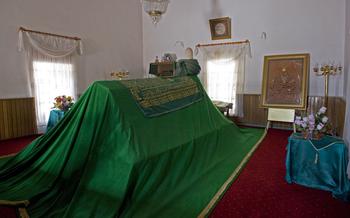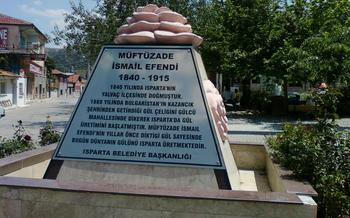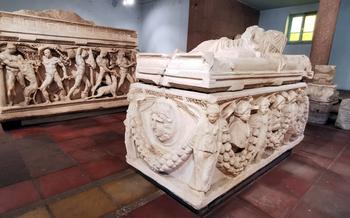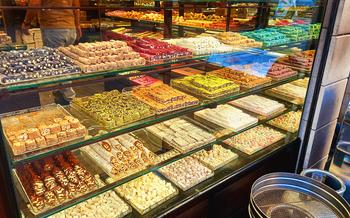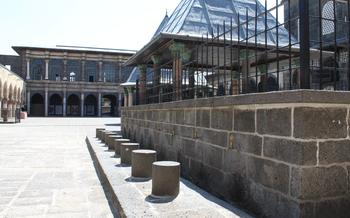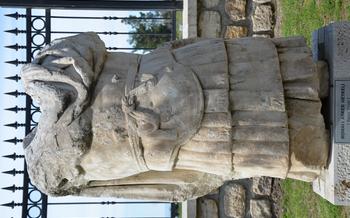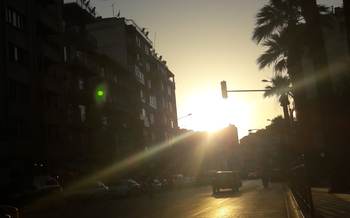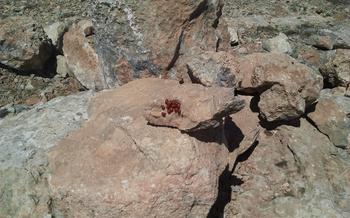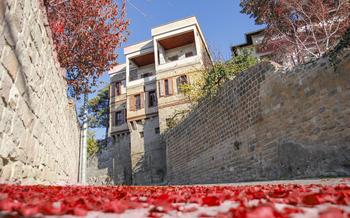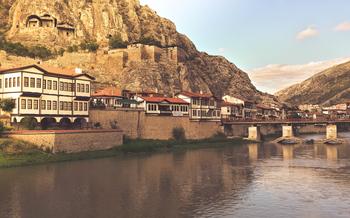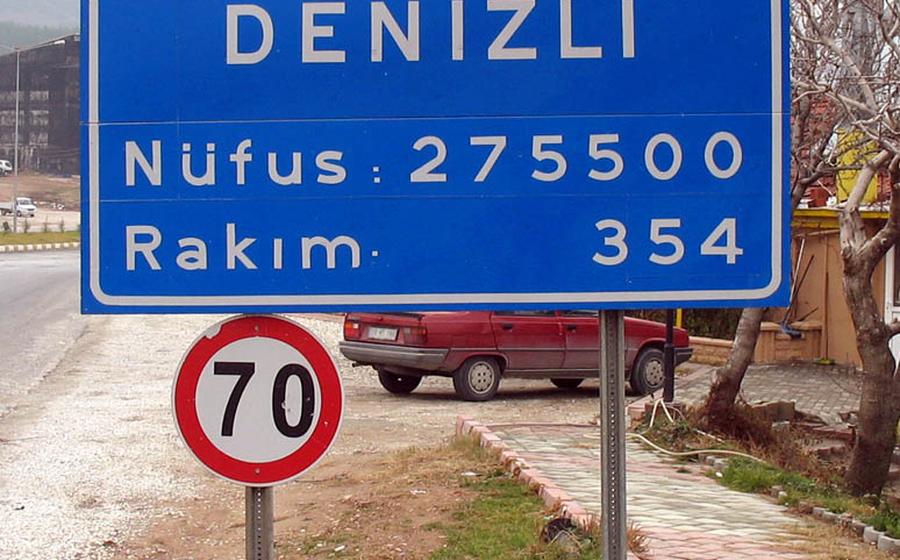
Servergazi Tomb
- Historical Significance
- Location and Accessibility:
- Architectural Features
- Interior Design and Decorations
- Historical and Cultural Importance
- Visiting Hours and Etiquette
- Guided Tours and Local Guides
- Nearby Attractions and Activities
- Local Cuisine and Dining Options
- Souvenirs and Handicrafts
- Local Festivals and Events
- Safety and Security
- Budget and Cost Considerations
- Responsible Tourism
- Insider Tip:
Historical Significance
The Servergazi Tomb is a revered pilgrimage site and a monument to the life and legacy of Servergazi, a renowned Sufi mystic and spiritual leader who lived in the 13th century. Born in Damascus, Servergazi's journey took him to Anatolia, where he settled in Denizli and became a prominent figure in the development of Sufism, a mystical dimension within Islam that emphasizes the spiritual transformation of the soul. His teachings and practices gained widespread recognition, attracting disciples from across the region who sought his guidance and wisdom. The tomb, erected in his honor, stands as a testament to his profound impact on the spiritual and cultural landscape of Denizli and beyond.
The tomb's architectural style reflects the Anatolian Seljuk architectural tradition, characterized by its intricate stonework, decorative motifs, and a harmonious blend of Islamic and Turkish influences. Its construction, commissioned by his devoted followers, symbolizes the profound reverence and respect accorded to Servergazi's legacy. The tomb has become a focal point for pilgrims and visitors seeking spiritual enlightenment, paying homage to Servergazi's teachings, and seeking blessings from his resting place.
Location and Accessibility:
The Servergazi Tomb is situated in the heart of Denizli, Turkey, a city renowned for its natural beauty and historical significance. To reach the tomb, visitors can conveniently take advantage of the city's public transportation system, with buses frequently departing from various points in Denizli. Alternatively, for a more personalized experience, visitors can opt to drive to the tomb, following clear road signs that guide the way.
The tomb's proximity to other notable landmarks in Denizli makes it an ideal starting point for exploring the city's rich cultural heritage. The iconic Pamukkale Travertines, with their cascading white terraces and thermal pools, lie just a short distance away, offering visitors a breathtaking natural spectacle. Additionally, the Denizli Archaeological Museum, housing a wealth of artifacts from the region's past, is within easy reach, providing a glimpse into Denizli's fascinating history.
For visitors with disabilities, the Servergazi Tomb is wheelchair accessible, ensuring that everyone can experience the beauty and tranquility of this sacred site.
Architectural Features
The Servergazi Tomb stands as a remarkable testament to the architectural prowess of the Anatolian Seljuk era. Constructed using traditional materials and techniques, the tomb showcases a harmonious blend of simplicity and elegance. The exterior façade is adorned with intricate stone carvings, displaying geometric patterns and Kufic inscriptions that add to its aesthetic appeal. The tomb's dome, a defining feature, is supported by a series of stalactite-like pendentives, creating a sense of grandeur and lightness. The minaret, located adjacent to the tomb, exhibits a similar architectural style, featuring decorative bands and a conical roof. Overall, the Servergazi Tomb's architectural features reflect the rich cultural heritage and craftsmanship of the Seljuk period.
Interior Design and Decorations
The interior of the Servergazi Tomb is a testament to the artistry and craftsmanship of the Seljuk era. As visitors step inside, they are greeted by a breathtaking display of intricate tilework, calligraphy, and other decorative elements. The walls are adorned with vibrant tiles, each hand-painted with geometric patterns, floral motifs, and verses from the Quran. The ceiling is adorned with a stunning dome, which features a mesmerizing array of colorful tiles and intricate stucco work. The tomb also houses a number of valuable artifacts, including the sarcophagus of Servergazi, which is intricately carved with verses from the Quran and other Islamic motifs. The interior design of the tomb is a harmonious blend of Islamic art and architecture, creating a serene and awe-inspiring atmosphere that leaves visitors in awe.
Historical and Cultural Importance
The Servergazi Tomb holds immense historical and cultural significance, serving as a sacred pilgrimage site for Sufi followers and attracting visitors from around the world. It is believed to be the resting place of Servergazi, a revered Sufi mystic and spiritual leader who played a pivotal role in spreading Sufism in the region during the 13th century. The tomb's historical importance is intertwined with the development of Sufism, a mystical branch of Islam that emphasizes inner purification and direct connection with the divine.
The Servergazi Tomb is a testament to the rich cultural heritage of Denizli and Turkey, showcasing the influence of Anatolian Seljuk architecture. Its intricate tilework, calligraphy, and decorative elements reflect the artistic and cultural traditions of the period. The tomb's enduring legacy lies in its ability to inspire and connect people from diverse backgrounds, fostering a sense of unity and spirituality among visitors who come to pay their respects and seek divine guidance.
Visiting Hours and Etiquette
The Servergazi Tomb is open to visitors daily from 9 am to 5 pm. However, it is closed during prayer times, which typically occur five times a day. Visitors should be respectful of these prayer times and avoid entering the tomb during these periods.
When entering the tomb, visitors are expected to dress modestly and remove their shoes. Women should cover their heads with a scarf or headscarf. It is also important to maintain silence and avoid disturbing other visitors who may be praying or meditating.
Photography and videography are allowed inside the tomb, but visitors should be respectful and avoid using flash or tripods. It is also important to obtain permission from the tomb's caretaker before taking any photos or videos.
By following these simple guidelines, visitors can ensure a respectful and meaningful experience at the Servergazi Tomb.
Guided Tours and Local Guides
For a more immersive and informative experience, consider booking a guided tour of the Servergazi Tomb. Knowledgeable guides can provide insights into the history, architecture, and cultural significance of the tomb, enhancing your appreciation for this remarkable site. Local guides are particularly valuable as they can share personal stories and anecdotes, bringing the tomb's history to life.
When choosing a guide, look for reputable tour operators or local guides with good reviews. Experienced guides can tailor the tour to your interests and pace, ensuring a personalized and engaging experience. Whether you're a history buff, an architecture enthusiast, or simply seeking a deeper understanding of Sufi culture, a guided tour is an excellent way to make the most of your visit to the Servergazi Tomb.
Nearby Attractions and Activities
Enrich your visit to the Servergazi Tomb by exploring the other attractions and activities that Denizli offers. Just a short distance away, you can immerse yourself in history at the Denizli Archaeological Museum, home to a wealth of artifacts from the region's ancient past. If nature calls, escape to the stunning Pamukkale Travertines, a natural wonder of cascading white terraces and thermal pools that will leave you spellbound. For a unique cultural experience, visit the colorful Denizli Rooster Bazaar, where you can haggle for traditional handicrafts and souvenirs amidst the lively atmosphere. For those seeking adventure, paragliding over the Honaz Mountain Range offers breathtaking views of the region. Plan a comprehensive itinerary to make the most of your time in Denizli and uncover its hidden gems.
Local Cuisine and Dining Options
Denizli offers a rich culinary experience, blending traditional Turkish flavors with unique regional ingredients. While visiting the Servergazi Tomb, be sure to savor the local delicacies that Denizli has to offer.
Denizli Köfte: Experience the famous Denizli Köfte, a delicious grilled meatball dish. These meatballs are made with a blend of ground beef, lamb, and spices, and are often served with grilled vegetables and rice.
Çiğdem Dolması: Indulge in Çiğdem Dolması, a unique dish made from stuffed çiğdem flowers. These wild flowers are carefully stuffed with a mixture of rice, herbs, and spices, creating a flavorful and aromatic dish.
Ördek Kebabı: For a taste of the local cuisine, try Ördek Kebabı, a succulent roast duck dish. The duck is marinated in a blend of spices and herbs, then slowly roasted until tender and juicy.
Kadayıf Dolması: Satisfy your sweet tooth with Kadayıf Dolması, a traditional Turkish dessert. This dessert consists of shredded phyllo dough filled with chopped walnuts and sweetened with syrup, creating a crispy and flavorful treat.
Where to Dine: For an authentic dining experience, head to one of the local restaurants near the Servergazi Tomb. Look for restaurants that serve traditional Turkish cuisine and offer a warm and welcoming atmosphere.
Souvenirs and Handicrafts
Visitors seeking a tangible memory of their visit to the Servergazi Tomb or Denizli can find a range of unique souvenirs and handicrafts to cherish. Local markets and shops offer an array of items that showcase the region's rich cultural heritage and artistic traditions.
Handcrafted carpets and kilims, adorned with intricate designs and vibrant colors, are a popular choice. These textiles are not only beautiful but also durable, making them a practical and decorative addition to any home.
Visitors can also find an assortment of ceramic and pottery items, each piece lovingly crafted by local artisans. From intricate tiles and plates to decorative vases and figurines, these ceramics showcase the region's renowned pottery traditions.
For those seeking a unique souvenir, consider purchasing a piece of Denizli's famous "telli" jewelry. These delicate and ornate pieces, crafted from silver and adorned with tiny beads, are a symbol of the region's rich craftsmanship.
When shopping for souvenirs, remember to haggle politely and respectfully with local vendors. Bargaining is a common practice in Turkey, and it's an opportunity to engage with the locals and secure a fair price.
Local Festivals and Events
Denizli and its surroundings are home to several local festivals and events that showcase the region's rich culture and traditions. One notable event is the Denizli Rooster Festival, held annually in April. This festival celebrates the local breed of rooster, known for its distinctive crowing. Visitors can witness rooster crowing competitions, traditional folk dances, and other cultural performances.
Another popular event is the Honaz Grape and Culture Festival, held in September in the Honaz district of Denizli. This festival honors the region's viticulture and winemaking heritage. Visitors can sample local grape varieties, participate in grape-stomping competitions, and enjoy traditional music and dance performances.
For those interested in history and archaeology, the Laodicea Ancient City Festival is a must-attend. Held in the ancient city of Laodicea, near Denizli, this festival brings history to life with reenactments, guided tours, and cultural exhibits. Visitors can explore the ruins of this once-thriving city and learn about its rich past.
To experience the vibrant energy of Denizli's local culture, visitors should not miss the Denizli City Festival. This festival, held annually in May, features a variety of events, including concerts, art exhibitions, sports competitions, and street fairs. It's a great opportunity to mingle with locals and immerse oneself in the city's lively atmosphere.
Safety and Security
Denizli is generally considered a safe city for travelers, and the Servergazi Tomb is located in a peaceful and well-maintained area. However, as with any destination, it's always advisable to take basic safety precautions.
Be aware of your surroundings and avoid walking alone at night in isolated areas. Keep your valuables safe and secure, and be cautious of pickpockets in crowded places.
Respect local customs and traditions, and dress modestly when visiting religious sites. Learn a few basic Turkish phrases to communicate with locals and show respect for their culture.
In case of an emergency, dial 112 to reach the police, fire department, or ambulance. English-speaking assistance may be limited, so it's helpful to have a translation app or phrasebook on hand.
Overall, by following these simple safety tips, you can have a safe and enjoyable visit to the Servergazi Tomb and Denizli.
Budget and Cost Considerations
Visiting the Servergazi Tomb in Denizli is generally affordable, with minimal costs involved. The entrance to the tomb is free of charge, allowing visitors to explore the site without any financial burden. However, guided tours are available for those seeking a deeper understanding of the tomb's history and significance. These tours typically have a nominal fee, ranging from 10 to 20 euros, depending on the length and depth of the tour.
Additional costs might include transportation to and from the tomb, which can be easily accessed by public transportation or taxi. If you choose to drive, parking fees may apply. Food and beverage expenses can be managed according to your preferences, with a variety of affordable options available in the vicinity of the tomb.
For budget-conscious travelers, packing a picnic lunch is a great way to save money while enjoying a meal amidst the serene surroundings of the tomb. Souvenirs and handicrafts related to the tomb or Denizli can be purchased at local markets or shops, with prices varying depending on the item and its uniqueness.
Overall, a visit to the Servergazi Tomb is an enriching and affordable experience, allowing visitors to delve into the history and spirituality of Denizli without breaking the bank.
Responsible Tourism
As a traveler, it's crucial to embrace responsible tourism practices when visiting the Servergazi Tomb and Denizli. By doing so, you can minimize your environmental impact and support the local community. Here are some tips to consider:
- Reduce your carbon footprint: Opt for public transportation, walking, or cycling to get around Denizli. Minimize your use of single-use plastics by carrying a reusable water bottle and shopping bag.
- Support local businesses: Dine at locally-owned restaurants, shop at traditional markets, and stay in small, family-run hotels. This directly benefits the local economy and preserves the region's unique character.
- Respect local customs and traditions: Dress modestly, especially when visiting religious sites, and be mindful of local customs. Ask permission before taking photos of people, and always treat locals with respect.
- Support sustainable tourism initiatives: Look for organizations that promote responsible tourism in Denizli. You can support their efforts by volunteering your time, donating to their causes, or choosing tour operators committed to sustainability.
By practicing responsible tourism, you can contribute to the preservation of Denizli's cultural heritage and ensure that future generations can also enjoy its beauty and significance.
Insider Tip:
For a truly immersive experience, plan your visit to the Servergazi Tomb during the annual Servergazi Festival held in Denizli. This vibrant celebration honors the life and teachings of Servergazi and showcases the rich cultural heritage of the region. Immerse yourself in traditional music, dance performances, Sufi rituals, and local delicacies as the city comes alive with festivities. It's an exceptional opportunity to connect with the local community and gain a deeper understanding of the significance of Servergazi and his legacy in Denizli. Don't miss this chance to experience the vibrant spirit of Denizli and create lasting memories.
